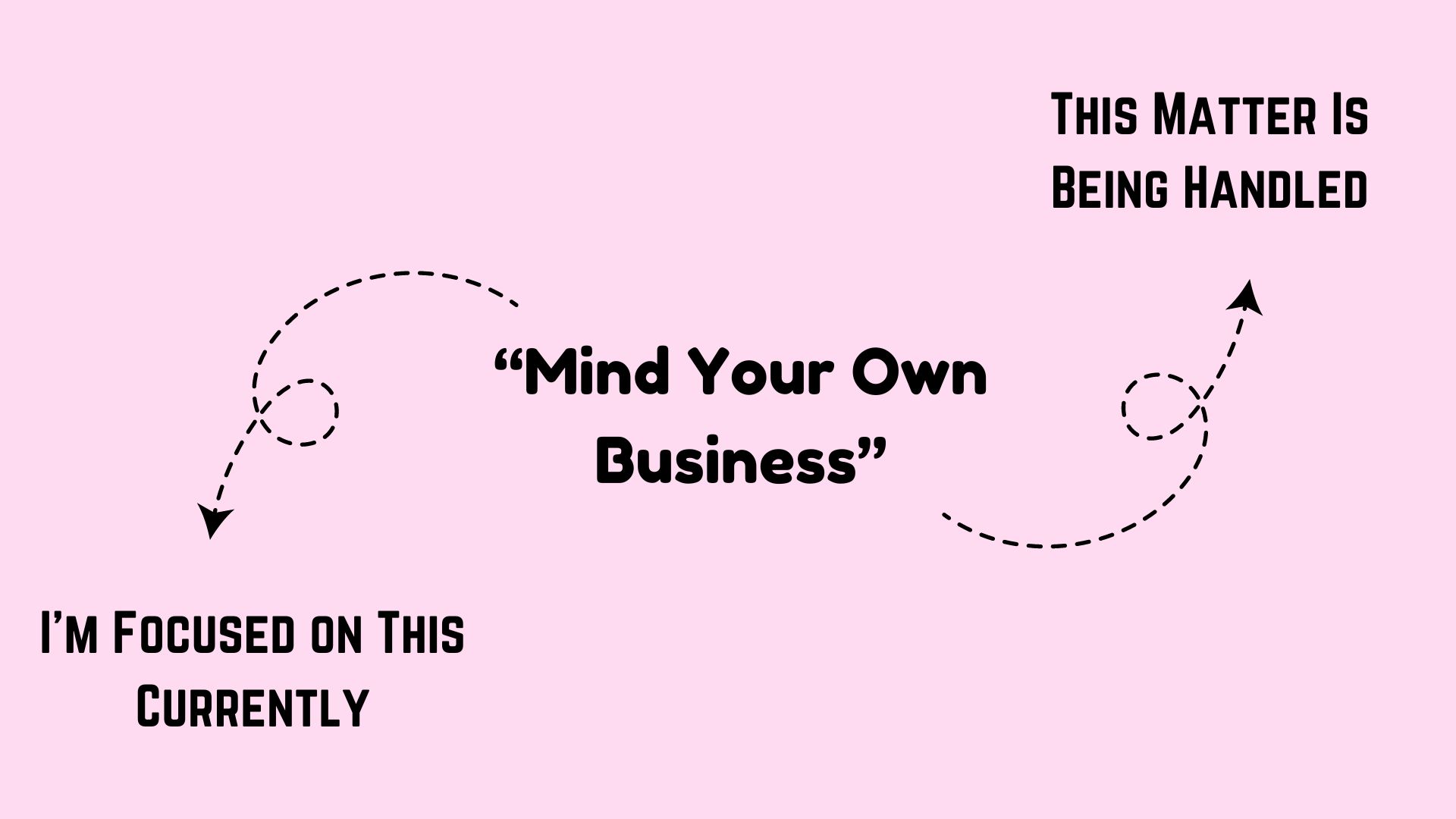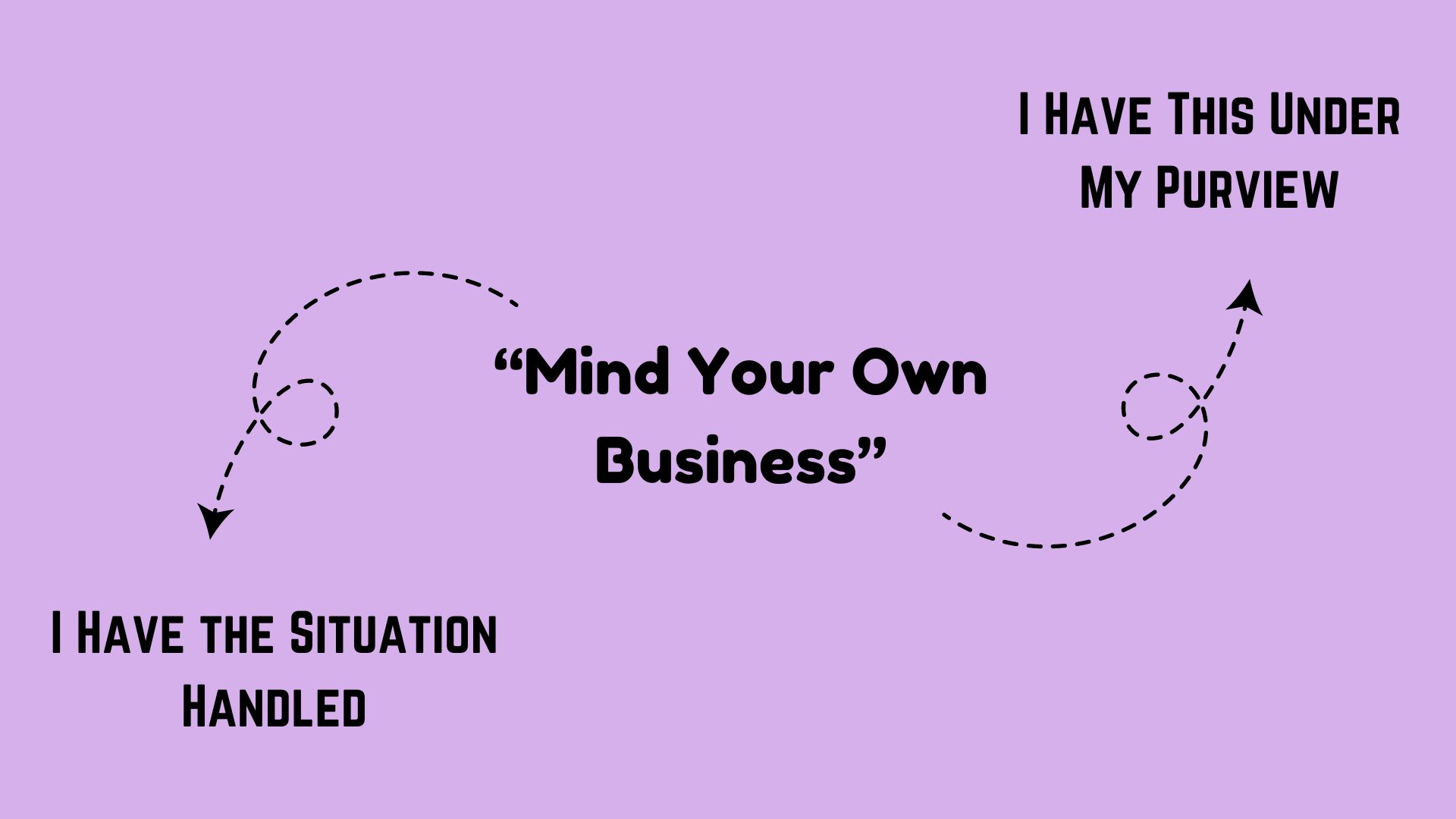In professional environments, it’s crucial to communicate boundaries respectfully and clearly. Here are 23 diplomatic ways to convey the sentiment of “mind your own business” without using harsh or unprofessional language. Each method includes an example and a use case to help you maintain professionalism while addressing overreach.
1. Please Focus on Your Tasks
Example: “Please focus on your tasks; I will manage this part.”
Use Case: When a colleague intervenes in areas outside their responsibility.
2. I Appreciate Your Interest, But I Will Handle It
Example: “I appreciate your interest, but I will handle it from here.”
Use Case: When someone offers unsolicited advice or assistance that isn’t needed.
3. Let’s Concentrate on Our Own Responsibilities
Example: “Let’s concentrate on our own responsibilities to ensure the best outcome.”
Use Case: When teamwork is being hindered by someone not focusing on their designated role.
4. I’ve Got This Covered
Example: “Thank you, but I’ve got this covered.”
Use Case: To politely decline unnecessary help or interference.
5. I Think It’s Best If I Handle This Myself
Example: “I think it’s best if I handle this myself to maintain consistency.”
Use Case: When a task requires specific knowledge or a particular approach that you possess.

6. Let’s Stick to Our Assigned Duties
Example: “Let’s stick to our assigned duties to maximize efficiency.”
Use Case: To gently remind a colleague to focus on their own tasks without sounding too direct.
7. I Will Reach Out If I Need Assistance
Example: “I will reach out if I need assistance, but for now, I’m fine, thank you.”
Use Case: When someone is overly eager to help, and you want to reassure them that you’ll ask if needed.
8. Thank You for Your Concern, I’ll Take It from Here
Example: “Thank you for your concern, I’ll take it from here.”
Use Case: Acknowledging someone’s concern while also signaling that you are in control of the situation.
9. I Prefer to Handle This Independently
Example: “I prefer to handle this independently, but thanks for offering.”
Use Case: When needing to assert your preference to work alone on a task without offending the offerer.
10. This Matter Is Being Handled
Example: “This matter is being handled, thank you for your attention to it.”
Use Case: When someone unnecessarily follows up on a task or issue that is already under control.

11. I’m Focused on This Currently
Example: “I’m focused on this currently and would appreciate some space to work on it.”
Use Case: When needing to explicitly ask for space without being too direct.
12. Each of Us Has a Specific Role
Example: “Each of us has a specific role, and I am confident in your handling of your part.”
Use Case: To remind colleagues of the importance of respecting each person’s unique contributions.
13. Let’s Respect Each Other’s Areas of Expertise
Example: “Let’s respect each other’s areas of expertise and focus on what we do best.”
Use Case: When someone steps outside their expertise into yours, and boundaries need to be set.
14. I’m Handling It, But Thanks for Checking In
Example: “I’m handling it, but thanks for checking in.”
Use Case: To acknowledge someone’s concern while reaffirming your own role in managing the situation.
15. It’s Under Control, But I’ll Keep You Posted
Example: “It’s under control, but I’ll keep you posted if anything changes.”
Use Case: When someone needs reassurance that a project or task is proceeding well without their intervention.

16. I’ll Manage This Aspect
Example: “I’ll manage this aspect, you focus on your strengths.”
Use Case: When dividing tasks according to each person’s strengths and areas.
17. I’m Committed to Handling This
Example: “I’m committed to handling this, so please focus on your priorities.”
Use Case: When someone’s involvement could detract from their own responsibilities.
18. I Have This Under My Purview
Example: “I have this under my purview; I’ll update you as necessary.”
Use Case: To clarify ownership of a task and the conditions under which updates will be provided.
19. Let’s All Focus on What We’ve Been Assigned
Example: “Let’s all focus on what we’ve been assigned to streamline our workflow.”
Use Case: When team efficiency is at stake due to overlapping efforts.
20. I’m Sure You Understand the Need for Concentration
Example: “I’m sure you understand the need for concentration on my tasks.”
Use Case: When hinting that uninterrupted focus is required for productivity.

21. I Have the Situation Handled
Example: “I have the situation handled, thank you for your readiness to assist.”
Use Case: When acknowledging someone’s willingness to help while indicating it is not needed.
22. Your Focus Is Better Spent Elsewhere
Example: “Your focus is better spent elsewhere, as I’ve got this covered.”
Use Case: When reallocating a colleague’s efforts is beneficial for the team’s goals.
23. I’ll Notify You If Your Input Is Needed
Example: “I’ll notify you if your input is needed, but for now, I’ve got it under control.”
Use Case: To set clear expectations about when and if their involvement will be necessary.
These phrases offer professional and respectful options for setting boundaries and encouraging colleagues to focus on their own responsibilities, thereby maintaining a harmonious and efficient work environment.

